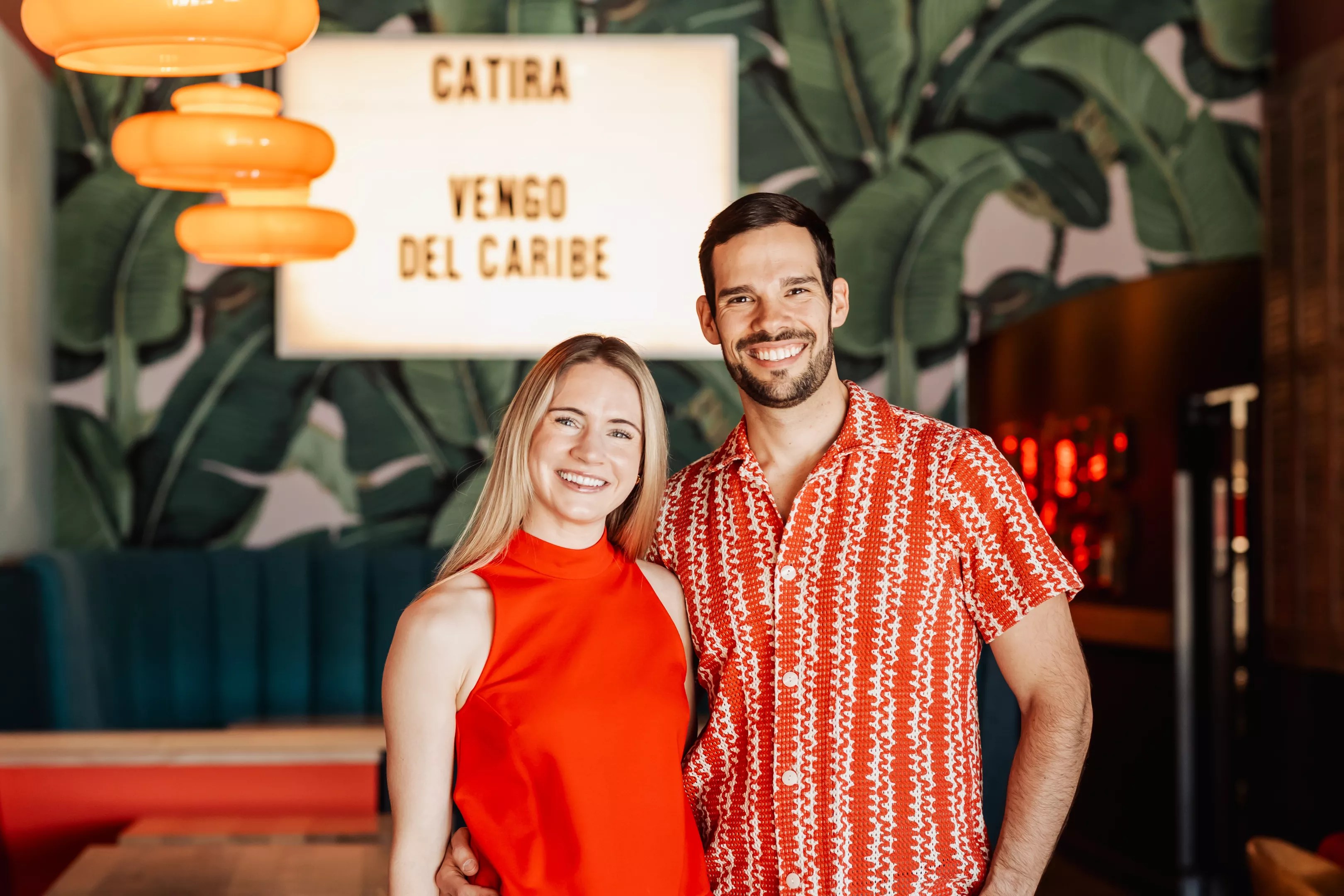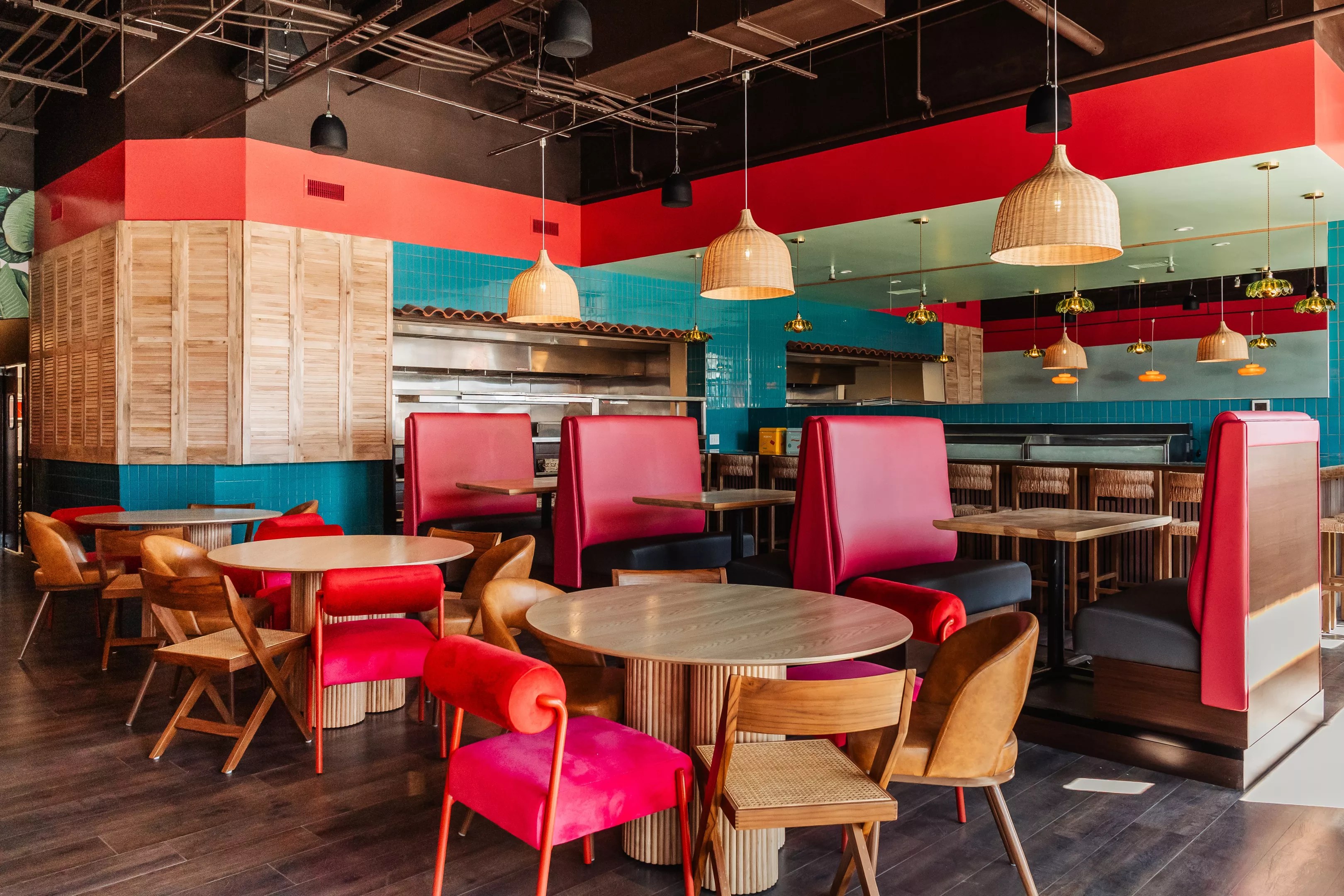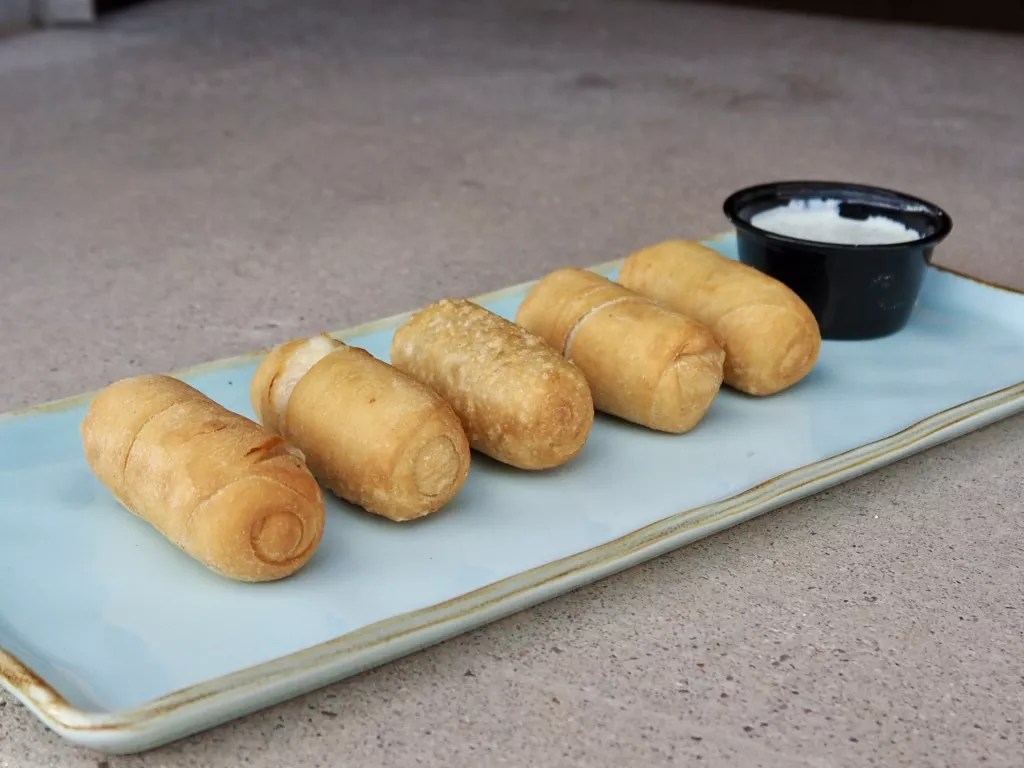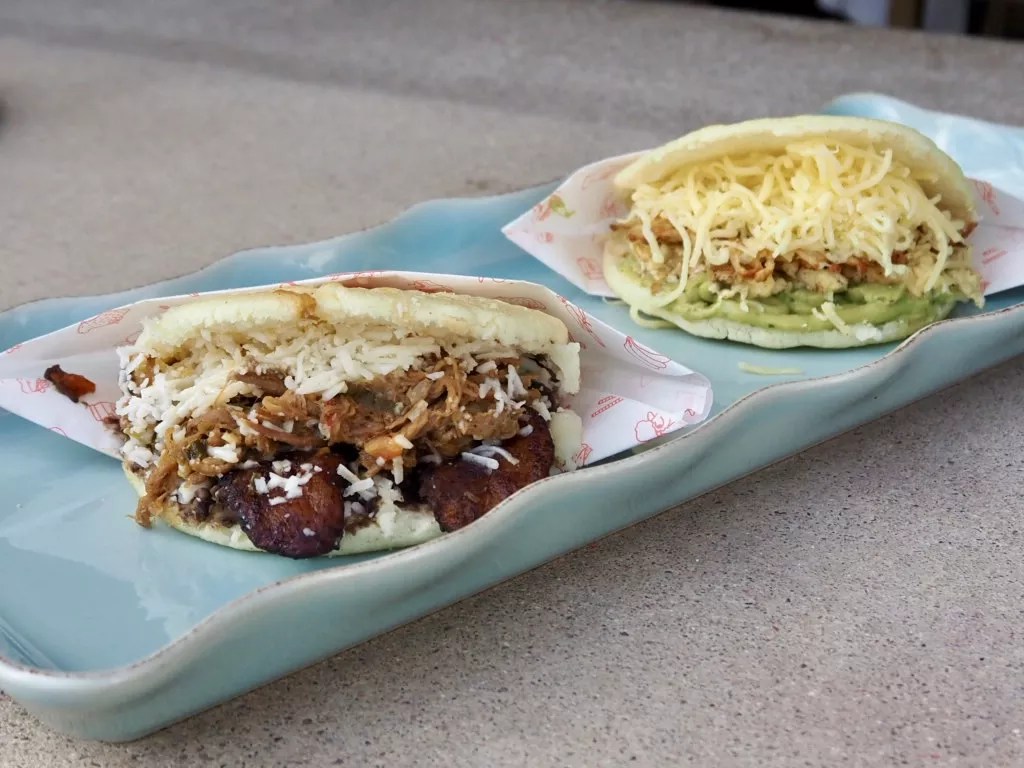

Audio By Carbonatix
Catira, which is proudly Venezuelan by design, is hosting a grand opening on April 14 with an invitation to Denver diners: Come for the food, stay for the culture. Co-founders Clare and Manuel Sucre hope that guests leave with more than just a full stomach – they want them to walk away with a broader view of Venezuela and the people behind the cuisine. That includes the kitchen team, many of whom graduated from Denver’s WorkReady program, a local workforce initiative the Sucres have actively supported.
Born in Venezuela, Manuel immigrated to the Boston area after high school and deeply loves his home country. “My passion has always been my country. Everyone that knows me knows that I love my country,” he declares. One way he stayed connected to his home was through its food; he taught himself how to cook the street food that he missed.
Clare grew up in Denver, where her family has a long history in the restaurant industry. Her grandfather is Vilis Berzins, a restaurant designer who was inducted into the Colorado Foodservice Hall of Fame in 2018; her parents founded Little Pub Company, which currently operates seventeen bars in the metro area. “I definitely bussed a lot,” she says of growing up. “You know, St. Patrick’s Day was always a big holiday, so when I was in high school I was the one running around clearing plates off of tables and grabbing napkins. Then when I became of age, I was bartending, serving tables. My brother worked in the kitchens, so we all had a little hand in it.”
But going into the industry wasn’t a given. Instead, based on her father’s advice, Clare went to Boston College for business and then worked in sales at Equinox, which is where she and Manuel met. After a few years of dating, they moved to San Diego. At the time, Manuel was in software sales – and hating it. “We had this conversation one day on a walk, and we said, ‘What do we want to do with our life?'” remembers Manuel. “And the three things we said were: We want to travel…we want to open a restaurant and we want to have a family.”
COVID hit soon after, and the couple moved to Denver. It was a practical decision, with family nearby to offer both industry connections and, in the future, maybe the occasional babysitting shift. Manuel quit his job in October 2023 and started working at his father-in-law’s restaurants, gaining experience both in front- and back-of-house operations. In 2024, they took off to travel, and Manuel brought Clare to Venezuela to show her the country he loved. That journey provided plenty of inspiration for their future restaurant.
Once back in Denver, they hit the ground running, leasing a space at the Landmark DTC in Greenwood Village last December. Because the location had previously been a restaurant, the renovation only spanned a few months; whenever hiccups did arise, Manuel was able to pick up the phone and pick his father-in-law’s brain. “He has thirty years of experience. Why not lean on him, on his experience, for Catira? We would be dumb if we didn’t,” says Manuel. But his father-in-law made it clear that while he’d serve as a mentor and a sounding board, “he wanted me to really take ownership and do everything.”

The Interior of Catira was inspired by Venezuelan decor.
From the very beginning, Catira (slang for “blondie” in Venezuelan Spanish) was an homage to Venezuela. “I think a lot of Venezuelan places that we’ve been to in the U.S. are very oriented towards Venezuelans, which is great because it’s hard for [Venezuelans] to go home or hear your language spoken,” explains Clare. “But we really felt like this was an opportunity not only to serve Venezuelans who are looking for that taste and feeling of home, but to bring that to Americans.” The goal is to make everyone feel comfortable in Catira, which has an upscale, fun decor that Americans are used to, a bilingual front-of-house staff trained to make recommendations to first-timers, and a curated menu that is approachable for Americans.
But the Sucres are clear: Catira is not fusion food. “The Venezuelan food that we’ll have here is the core cuisine of Venezuela. This is the street food. This is what people make at home. We really wanted to honor the fact that this is nothing fancy,” Manuel says.
Adds Clare: “Sometimes when it feels like [restaurants] are trying to dress it up, it kind of loses that taste of home that you’re looking for.”
The four core dishes are tequeños (think Venezuelan cheese sticks) and cachapas (griddled sweet corn pancakes), as well as empanadas and arepas, which both come with a choice of proteins such as shredded chicken, beef, fish and Impossible ground meat. Manuel predicts that the tequeños will be the customer favorites, especially the dessert version stuffed with Nutella. (Our favorite was the Caribeña empanada stuffed with shredded mahi mahi, onions and peppers.)

Manuel predicts the tequeños will be customer favorites.
Clare Sucre
And don’t count out the arepas. “You can find arepas in a lot of places in Denver…but ours are going to be a little more crunchy, just how we make them at home. Skinnier, crunchier and more, in my opinion, more delicious,” Manuel says. Look for the Bebesota arepa, inspired by the arepa that Manuel used to make Clare when they first started dating. It’s a breakfast version with eggs, hash browns, gouda cheese and avocado, designed to satisfy Clare’s pescatarian diet.
All the cocktails will be made with Venezuelan rum, paired with tropical flavors of guava, mango and passionfruit. Manuel moved mountains to “bring the most popular Venezuelan beer, Polar, to Colorado. It involved pulling the right strings on the Polar side in Venezuela and also connecting with a local Denver distributor,” explains Clare. Catira will be the first restaurant in Colorado to offer it, and will be serving the beer on ice in a colorful cava (cooler) popular with Venezuelans when visiting the beach.
To keep the menu accessible, the Sucres have priced all items at less than $20, and the empanadas and arepas under $10. They recommend that two people split an appetizer, then each order either an empanada or arepa. They’ve also intentionally kept the menu small. “We’re starting with the basic food items…to introduce our food to Americans. At the beginning, it’s going to be easy for Americans to pick what they want. It’s very familiar flavors: It’s cheeses, meats, it’s cornmeal, avocado, a lot of veggies,” explains Manuel. They plan to gradually expand the menu through monthly specials that test new recipes, including those developed by their staff.

Clásica arepa (left) and Bebesota arepa (right).
Clare Sucre
It’s clear when Manuel talks about Venezuela how much he loves and misses his country. “People say Venezuela is a country of migrants,” he says. “If Venezuela was in a better political, economic, security situation, we would all be there. We would not leave our country. Why would we leave a country where it’s just beautiful, genuine people? If there were opportunities to live a normal life, we would all be there.”
But because he can’t move back, the couple has made Catira an introduction to the Venezuela they don’t often see portrayed in the media. The food, drink, music and hospitality are all core Venezuela. And the decor, which was designed by Clare’s aunt, incorporates vintage elements of Venezuela that the couple see as emblematic of Venezuela. There’s beautiful turquoise tile work on one wall of the restaurant, banana leaf motifs, shutters commonly found on Venezuelan homes, and waves carved into the plaster of the wall to give it a Caribbean vibe.
The service window has detailing with traditional clay mission roof tiles; it’s a story in itself how Manuel found someone willing to sell him 22 roof tiles. The hallway to the bathroom is lined with photographs of Manuel’s family. Almost the entire kitchen staff is Venezuelan, sourced from the WorkReady culinary program that the Sucres helped get off the ground with the help of Centro de los Trabajadores and MSU Denver’s School of Hospitality. “Kitchens are such a great place for people to start when they don’t have a grasp of the English language and they’re new,” explains Clare. “The whole idea of the WorkReady program is to create a pipeline of employees who are ready to work and can legally work.”
Catira is one of those enthusiastic employers. “At the beginning of 2024, we saw this migration of people from Venezuela. They’re all looking for a better opportunity. Yes, there’s some bad people – I get it – but most people are good people, and they want to work and they all want to be here for a better future for their families,” explains Manuel. Additionally, Clare had started an ESL program for kitchen workers at her parent’s company and she’s bringing that to Catira, as well as offering it to all other businesses in shopping district where they’re located.
For the Sucres, Catira is a way to change minds about immigrants, and about the people at the center of today’s political wars. “We meant to package the Venezuelan experience, the best parts of the culture, of the food, of the drink and give Americans the chance to experience it,” concludes Clare. “Then they’ll understand why Venezuelans are so proud to be Venezuelan, despite some of the issues with the country.”
Ultimately, Catira isn’t about nostalgia or politics – it’s about representation. It’s a chance to show a different side of Venezuela through everyday things: good food, good drinks, and good work.
Catira will be open from 11 a.m. to 10 p.m. Sunday through Thursday, and 11 a.m. to midnight Friday and Saturday at 5370 Greenwood Plaza Boulevard, #107, Greenwood Village. Learn more at holacatira.com.